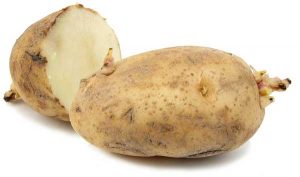Michael Pollan on french fries and what you don’t know about food production
What is so interesting about this short and impinging video is how our wishes and wants actually impact farming and production.

Russet Burbank Potatoes
When food is mass produced the industry drives down the prices with economies of scale, and of course we ‘want’ cheaper and good-looking food, right? But this implies that this food is chosen and farmed differently, with chemicals and industrial procedures to get those squeaky clean and beautifully colored produces perfect in the aisle and on the plate.
These products are not obtained in a natural and environmentally friendly way: it all comes at a cost. Among other consequences, the great variety is killed, in favor of just one type that ‘fits’ and we loose the biodiversity.
The small farmer, who goes a long way to grow healthy and organic food, cannot compete with the giants in the industry. So he also suffers, and so do we, because now we get much less choice.
Before we just condemn the super giants we should actually look at ourselves: what are we choosing and buying?
 We do make the difference.
We do make the difference.
I don’t mind if a potato is not perfect or if an apple has the signs of an insect feasting on its nutritious nectar. I don’t mind if a pepperoni isn’t perfectly red all over, or giant in size, and so on. I know that organic produce is usually smaller, with less sex-appeal on the aisle, but the nutrition value is so much higher and safer. And in my family I’ve been the activist to make this point: produce isn’t always perfect in nature, because it’s part of a whole cycle with earth, insects and life around it.
I’m not advocating that we should choose ugly produce, of course. I was greatly impressed with the giant (and healthy!) produce The Barefoot Farmer is growing with perfectly natural methods, as shown in a recent post on plants and growth
![© Photograph by Alan Messer [alanmesser.com]](https://ecogal.tv/wp-content/uploads/2018/12/The-Barefoot-Farmer-Jeff-Poppen-Photo-by-Alan-Messer-300x200.jpg)
JEFF POPPEN – Long Hungry Creek Farm – 10.20.11 © Photograph by Alan Messer [alanmesser.com]
I think that as consumers we can really make our voices heard and change the ways of the food industry by supporting biodiversity: try the various kinds of potatoes for example, each with an own, special taste and benefits, and be adventurous in selecting vegetables and fruits ‘you don’t know how to cook’: you can easily find a recipe and explanation on the Internet. It’s a fun adventure and will bring about the needed variety in food and nutrition values we so much need to stay healthy.
Are you actively choosing the products you eat? What is your experience with that? Let me know in the comments.
From the video information:
Renowned activist and author Michael Pollan illustrates how McDonald’s insists on using Russet Burbank Potatoes, a potato in America that is unusually long and difficult to grow. They further insist that their potatoes have no blemishes at all, which is hard because these potatoes commonly suffer from what is referred to as Net Necrosis, which causes unwanted spots and lines on the potatoes.
If they have this, McDonald’s won’t buy them and the only way to eliminate this is through the use of a pesticide called methamidophos (Monitor) “that is so toxic that the farmers who grow these potatoes in Idaho won’t venture outside and into their fields for five days after they spray.”
When McDonald’s is ready to harvest their potatoes, they have to put them in giant atmospheric controlled sheds the size of football stadiums because they are not edible for six weeks. “They have to off gas all the chemicals in them.”
